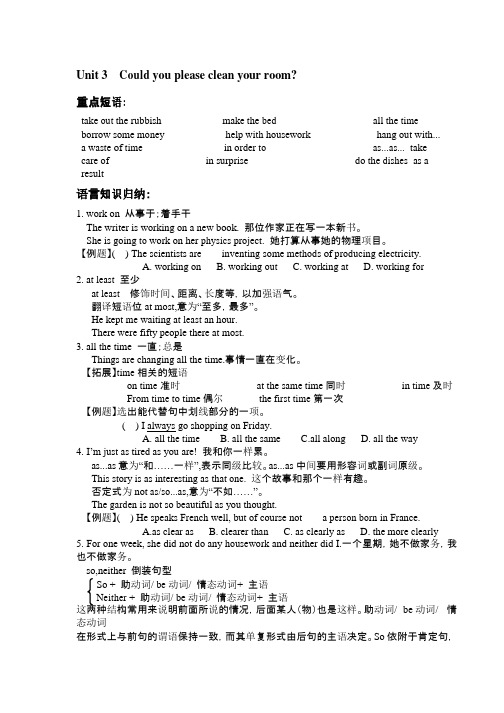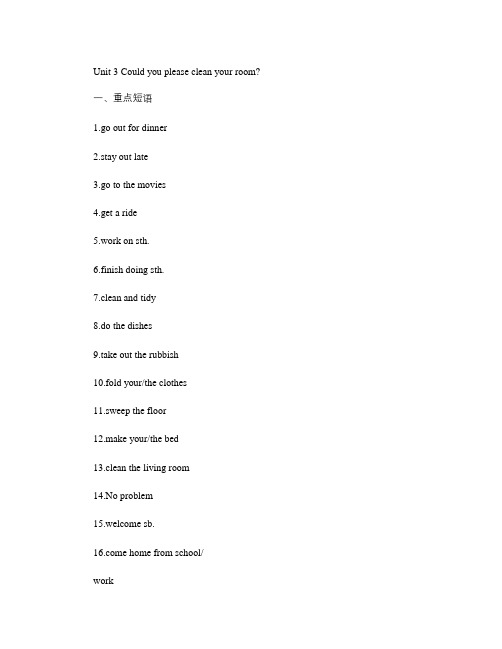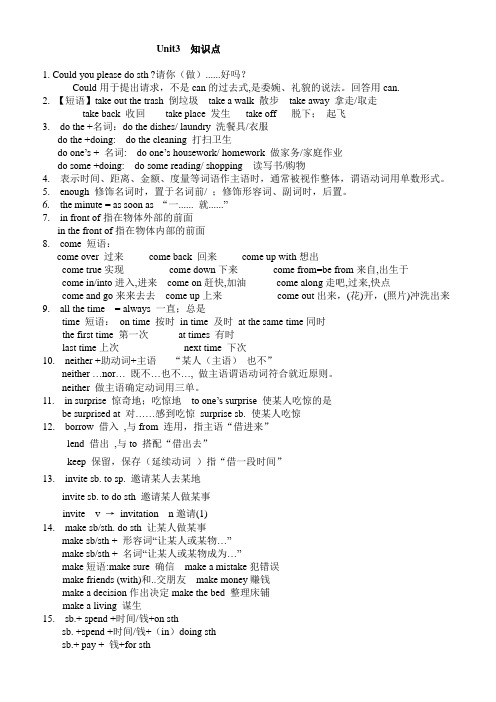Unit 3 Could you please clean your room
- 格式:doc
- 大小:31.50 KB
- 文档页数:3


Unit3 Could you please clean your room?重点短语:take out the rubbish make the bed all the time borrow some money help with housework hang out with...a waste of time in order to as...as...take care of in surprise do the dishes as a result语言知识归纳:1. work on 从事于;着手干The writer is working on a new book.那位作家正在写一本新书。
She is going to work on her physics project. 她打算从事她的物理项目。
【例题】( ) The scientists are____inventing some methods of producing electricity.A. working onB. working outC. working atD. working for2. at least至少at least修饰时间、距离、长度等,以加强语气。
翻译短语位at most,意为“至多,最多”。
He kept me waiting at least an hour.There were fifty people there at most.3. all the time 一直;总是Things are changing all the time.事情一直在变化。
【拓展】time相关的短语on time准时From time to time 偶尔at the same time 同时the first time第一次in time及时【例题】选出能代替句中划线部分的一项。
( ) I always go shopping on Friday.A. all the timeB.all the sameC.all alongD.all the way4. I’m just as tired as you are! 我和你一样累。

河南省八年级英语下册Unit3Couldyoupleasecleanyourroom易混淆知识点单选题1、My mother is hard-working. she does for my family, she feels.A.More; happierB.The much; the happyC.The more; the happierD.The most; the happiest答案:C句意:我妈妈是努力工作的,她为我们家人做的越多,她感觉越高兴。
根据 the +比较级,the+比较级越---就越---; more更多, happier更幸福, much多, happy幸福,most最多,happiest最幸福;故选C2、—When does the online class begin, Mrs. Grace?—At eight o'clock. Tell Cindy __________late.A.not beB.not beingC.not to be答案:C句意:——网上课程什么时候开始,Grace夫人?——8点钟。
告诉Cindy不要迟到。
考查动词不定式。
tell sb to do sth.告诉某人做某事,固定搭配;根据语境可知,网课八点钟开始,所以应该是告诉Cindy不要迟到,tell sb not to do sth.告诉某人不要做某事;be late迟到,固定词组;故答案选C。
3、—Could I your iPad, Alice?—Of course. Here you are.A.lendB.keepC.borrowD.return答案:C试题分析:句意:-我可以借你的ipad吗,爱丽丝?-当然。
给你。
lend借出;keep 保持,保存;borrow借入;return归还。
所以选C。
考点:考查动词辨析。
4、Our teachers have been with us for nearly three years ________ we came to junior high school. We should thank them for what they have done for us.A.untilB.beforeC.sinceD.when答案:C句意:自从我们上初中,老师们已经和我们在一起差不多三年时间了。


Unit 3 Could you please clean your room?1.小明放学后非要帮妈妈做家务,妈妈说你不会干,别捣乱,一边玩去,小明还是坚持要帮忙,说是老师给布置的任务,妈妈说:你们老师屁事真多!第二天,小明把帮妈妈做家务整个过程的日记交给了老师。
2.我曾经尝试过做饭,但每次我都会把厨房变成一个烟雾缭绕的战场。
现在,我确信我的厨艺唯一能做的就是制作烟雾报警器。
3. 有一次,我决定自己洗衣服。
不幸的是,我把红袜子和白衬衫放在了一起。
结果,我得到了一件粉色的衬衫和一堆淡红色的袜子。
看来我在洗衣方面的创新精神比我想象的要强。
4. 老婆总是说我不会做家务。
有一天她不在家,我决定展示一下我的能力。
我打扫了整个房子,甚至把家具都重新布置了。
当老婆回到家时,她看着我,然后说:“你确定你是打扫了,而不是把家里翻了个底朝天?”5. 我试图拖地,但每次拖把都会比我先累。
我猜它可能是在抗议我让它做的太多工作。
6. 我尝试做饭,打开食谱应用程序,发现需要10分钟准备,50分钟烹饪。
到现在我已经花了45分钟在决定做什么菜。
7. 我发现了一种新的家务活动——找东西。
我妻子总是让我找她的钥匙、手机或其他东西。
我想我应该把这个加到我的简历上,我现在是一名专业的“失物搜寻者”。
8. 我妻子总是抱怨我不帮忙做家务。
但我认为我在精神支持方面做得很好——我总是鼓励她去看那些家务做得很好的电视节目。
拓展阅读(一)There are certain things you never imagine yourself saying.“I just got a worm in my eye!” is one of them.And yet I did say it—I screamed it, actually.The family was all here and we were in the garden, when I saw a worm nearby. I asked my six-year-old grandson to come over and remove the worm. He picked up the worm, studied it quickly and then threw it into the air.The worm quickly fell back to earth, landing on my face against my left eyelid. That’s when the screaming started and the jumping up and down.You know how they say when you meet a small creature, that the small creature is just as afraid of you as youare of it? They lie.The worm showed no fear. I, however, am still having nightmares about the experience, which was several days ago.The most important thing in all this is that my grandson said he was sorry to me.I’d just been reading a book that makes a connection between adults doing the slow and hard work of teaching manners to children and greater levels of civility in society.Table manners, language manners and even manners in dress all show levels of self-control.Having self-control limits what we say and how we behave, making many of us appear a good deal better than we really are.Good manners also have the possibility to make mealtime a pleasant experience, even with small children.All of my grandchildren, except the ones that can’t yet talk, ask to be excused before leaving the table.It is a sign of respect for others at the table and a sign of respect for the meal itself. It’s also more pleasant than pushing one’s chair back and running for the back yard.Those tall enough, and even those not tall enough, also take their dishes to the kitchen.Manners are what civilize us—around our tables, in our families, homes and our communities.So when a little boy has the courage to apologize to a grandma who is screaming and jumping up and down, at least we know that our years of teaching young people manners are paying off—one worm at a time. 1.Where were they when the author saw a worm?A.In the house.B.In the garden.C.In the park.D.In the back yard.2.The worm fell down on the author’s________.A.leg B.head C.left eyelid D.right eyelid3.What does the underlined word “nightmares” mean?A.好运B.噩梦C.回忆D.愿望4.The author believed that his grandson’s apology is________.A.a good manner B.a bad behavior C.unnecessary D.a must5.What does the passage tell us?A.The importance of apology.B.The importance of good manners.C.Many kinds of good manners.D.A story of a worm.【答案】1.B 2.C 3.B 4.A 5.B【导语】本文主要以作者与其孙子的故事来讲述礼仪的重要性。

Unit 3 Could you please clean your room?一、重点短语1.go out for dinner2.stay out late3.go to the movies4.get a ride5.work on sth.6.finish doing sth.7.clean and tidy8.do the dishes9.take out the rubbish10.fold your/the clothes11.sweep the floor12.make your/the bed13.clean the living room14.No problem15.welcome sb.e home from school/work17.throw down18.throw away e over (to+地点20.take sb. for a walk21.all the time22.all day/evening23.do housework24.shout back 大声回应25.walk away26.share the housework27.a comfortable home28.(do sth. in surprise 惊讶地(做…29.get something to drink30.watch one show31.hang out32.pass sb. sth.33.lend sb. sth.34.get sth. wet35.hate + (to do/ doing sth.36.do chores37.help sb.(todo /with sth38.bring a tent39.buy some snacks40.go to the store41.invite sb. to a party42.make sb. do sth.43.enough stress44.waste of time45.in order to为了46.get good grades47.mind doing sth.48.depend on49.develop children 's independence50.look after/take care of51.do one’ s part in (doing sth.做某人分内的事三、单元知识点1. Could you please +动词原形? 你能……吗?Could在句子开头,不表示过去时态而表示请求,以表示礼貌、委婉或不确定的语气,而can则不具备这些语气,这种情况下不能把could看作can的过去式。

河南省八年级英语下册Unit3Couldyoupleasecleanyourroom重点知识归纳单选题1、—Could you please have a walk with me?—Sorry, I _______. I have something important to do now.A.mustn’tB.needn’tC.can’tD.may not答案:C句意:——你能和我走走吗?——对不起,我不能。
现在我有重要的事情要做。
考查情态动词的用法。
mustn’t不可以,表禁止;needn’t不必;can’t不能;may not可能不。
Could在这里表示语气婉转、客气,所以用can’t回答不能,故选C。
2、—Jim, I have ________ in finishing so much work.—Don't worry. I can help you.A.abilityB.successC.experienceD.difficulty答案:D句意:——Jim,我很难完成这么多工作。
——不要担心,我可以帮助你。
考查名词辨析。
ability能力;success成功;experience经验;经历;difficulty困难。
根据下面的答语中“I can help you”可知,说话人表示他有困难,使用的句型是have difficulty in doing sth.“做某事有困难”。
故选D。
3、They read the article very carefully ________ they can find out the answer as fast as possible.A.as soon asB.so thatC.as long asD.now that答案:B句意:他们仔细阅读这篇文章,以便尽快找到答案。
考查连词辨析。
as soon as一……就……;so that以便;as long as只要;now that既然。

unit 3 Could you please clean your room?话题相关:Could you please+动词原形?表示请求的句子,意为“请你......好吗”,其否定形式是Could you please+not+动词原形?句中could 表示请求,不表示过去,只表示委婉的语气短语do the dishes 洗餐具take out取出;拿出take out the rubbish倒垃圾fold the clothes 叠衣服sweep the floor 扫地make the bed 铺床work on 从事;创作clean the living room 打扫起居室go out 出去stay out 待在外面;不在家help out 帮助做完某事in front of 在......前面come over 过来;顺便来访hang out 闲逛do chores 做家务at least 至少throw down 扔下all the time 频繁;反复in surprise 吃惊地;惊讶地as soon as 一.......就a waste of time 浪费时间spend...on... 在......上花费(时间或金钱)in order to 为了,目的是depend on 依靠;信赖;取决于,由......决定keep it clean and tidy 保持它干净、整洁get into 进入take care of 照顾;处理as a result 结果provide sth. for sb.=provide sb. with sth. 为某人提供某物a developed country 一个发达国家a developing country 一个发展中国家a life of independence 独立的生活an independent country 一个独立自主的国家have no idea “不知道”=don't knowtake care of “照顾;处理”=look after=care for take good care of “好好照顾......”=look after.....well as a result 结果;因此as a result of 由于.......;作为......结果句型和固定结构finish doing sth. 做完某事neither+连系动词be/助动词/情态动词+主语. .....也不hate to do sth. 厌恶做某事let sb. do sth. 让某人做某事spend...doing sth. 花费......做某事provide sth. for sb. 向某人提供某物learn to do sth. 学会做某事learn how to do sth. 学会怎样做某事do one's part in (doing) 尽自己的职责做某事as.....as... 与.......一样not as/so...as... 不如......borrow sth. from sb. “向某人借某物”hate sb./sth. 讨厌某人/某物hate to do sth./doing sth. 厌恶做某事enjoy doing sth 喜欢做某事buy sb.sth.=buy sth. for sb. "给某人买某物invite sb. to +地点名词“邀请某人到某地”invite sb. to do sth. “邀请某人做某事”make sb. do sth. 让/使某人做某事help with sth. =help (to) do sth.帮忙做某事There is no need for sb. to do sth.“对于某人来说,没有必要做某事”解释minute n.分钟;片刻(1)any minute now “随时;马上;在任何时刻”,表示事情有可能在极短的时间内发生或眼下就要发生。

人教版英语八年级下册Unit 3《Could you please clean your room》说课稿一. 教材分析人教版英语八年级下册Unit 3的主题是“Could you please clean your room?”,主要讨论了日常生活中的一些请求和回应。
通过本节课的学习,学生能够掌握情态动词could的用法,学会如何礼貌地提出请求和回应请求。
教材内容丰富,包括听力、口语、阅读和写作等多个方面,有助于全面提高学生的英语综合能力。
二. 学情分析根据我对学生的了解,他们已经掌握了情态动词can的用法,并具备了一定的听说读写能力。
然而,对于情态动词could的用法,他们还比较陌生。
此外,部分学生在表达请求时,还存在着语气生硬、不礼貌等问题。
因此,在教学过程中,我需要针对这些情况,采取适当的教学策略,帮助学生掌握情态动词could的用法,并培养他们礼貌表达请求的能力。
三. 说教学目标1.知识目标:学生能够掌握情态动词could的用法,了解其表示请求的礼貌性。
2.能力目标:学生能够熟练运用情态动词could提出请求和回应请求,提高日常英语交流能力。
3.情感目标:通过本节课的学习,学生能够学会尊重他人,培养礼貌待人的良好习惯。
四. 说教学重难点1.教学重点:情态动词could的用法,如何用could提出请求和回应请求。
2.教学难点:情态动词could与can的区别,以及在实际情景中灵活运用。
五. 说教学方法与手段1.教学方法:采用任务型教学法,情境教学法,交际法等,激发学生的学习兴趣,提高他们的参与度。
2.教学手段:利用多媒体课件、图片、实物等,创设真实情境,帮助学生更好地理解和学习。
六. 说教学过程1.导入:通过播放一段关于孩子们日常生活的视频,引出本节课的主题“Could you please clean your room?”。
2.新课呈现:介绍情态动词could的用法,并通过例句展示如何用could提出请求和回应请求。

新目标八年级下册Unit 3 Could you please clean your room?讲义一、词性转换Section A1.sweep →(pt.)swept2.throw →(pt.) threw3.fold→(pt.) folded Section B1. lend →(pt.) lent2. hate →(pt.) hated3. stress →(v.) stress4. waste →(v.) waste5. provide →(pt.) provided6. depend→(pt.)depended7. independence →(adj.) independent8. fairness →(adj.) fair9. unfair →(反义词)fair二、短语归纳1. do the dishes 洗餐具2. take out the rubbish倒垃圾3. fold your clothes叠衣服4. sweep the floor 扫地5. make your/the bed 整理床铺6. go out for dinner 出去吃饭7. throw down 扔下8.in surprise 惊讶地9. hang out 闲逛10. hate to do sth. 讨厌做某事11. do chores 做杂务12.enough stress足够的压力13. in order to为了14. provide sth. for sb.向某人提供某物15. get good grades取得好成绩16.mind doing sth. 介意做某事17. depend on依赖;依靠18. look after 照顾,照看19. keep it clean and tidy保持它干净整洁20. get into 进入21. take care of 照顾22. as a result 结果23. do one’ s part in (doing )sth. 做某人分内的事24. get a ride 搭车25.stay out late在外面待到很晚三、句型集萃1. Could you please help out with a few things? 你能帮忙做些事情吗?2.Mom will be back from shopping at any minute now. And she won’t be happy if she sees this mess.妈妈现在随时都会购物回来,如果她看到这些一团糟,会不高兴的。

Unit3 Could you please clean your room?【重点单词】rubbish [ˈrʌbɪʃ] n. 垃圾,废物take out the rubbish 倒垃圾fold [fəʊld] v. 对折,折叠mess [mes] n. 混乱,脏乱,食堂throw [θrəʊ] v. 扔,投掷all the time 频繁,反复neither [ˈni:ðə] pron.adv. 二者都不;也不shirt [ʃə:t] n. 运动衫,衬衫as soon as 一…就…,尽快pass [pɑ:s] v. 前行,经过,批准borrow ['bɒrəʊ] v. 借,借用lend [lend] v. 借给,借出finger [ˈfiŋgə(r)] n. 手指hate [heɪt] v. 憎恶,讨厌chore [tʃɔ:(r)] n. 杂务,乏味的工作while [wail] conj. 当...时候,而,然而snack [snæk] n. 小吃,点心,快餐stress [stres] n. 精神压力,心理负担waste [weɪst] v. 浪费,消耗in order to 目的是,为了provide [prə'vaid] v. 提供,供给,供应anyway [ˈeniwei] adv. 无论如何,不管怎样,而且depend [diˈpend] v. 取决于,依靠,依赖depend on 依靠于develop [dɪˈveləp] v. 发展,壮大,开发,研制independent [ˌindiˈpendənt] adj. 独立自主的,不受约束的independence [ˌɪndɪ'pendəns] n. 独立fair [fɛə] adj. 公平的,公正的unfair [ˌʌnˈfeə] adj. 不公平的,有偏见的fairness [ˈfeənɪs] n. 公正性,合理性since [sɪns] conj. 因为,既然neighbor [ˈneɪbə] n. 邻居take care of 照顾,处理ill [il] adj. 生病的,有病的drop [drɔp] v. 落下,跌落【重点短语】1.go out for dinner 出去吃饭2.stay out late 在外面待到很晚3.go to the movies 去看电影4.get a ride 搭车5.work on 从事6.finish doing sth. 完成做某事7.clean and tidy 干净整洁的8.do the dishes 洗餐具9.take out the rubbish 倒垃圾10.fold your/the clothes 叠衣服11.sweep the floor 扫地12.make your/the bed 整理床铺13.clean the livng room 打扫客厅14.no problem 没问题15.welcome sb. 欢迎某人e home from school/work放学/下班回家17.throw down 扔下18.sit down 坐下e over 过来20.take sb. for a walk 带某人去散步21.all the time 一直;总是22.all day/evening 整曰/夜23.do housework 做家务24.shout back 大声回应25.walk away 走开26.share the housework 分担家务27.a comfortable home 一个舒适的家28.in surprise 惊讶地29.get something to drink 拿点喝的东西30.watch one show 观看一个节目31.hang out 闲逛32.pass sb. sth. 把某物传给某人33.lend sb. sth. 把某物借给某人34.get sth. wet 使某物弄湿35. hate to do sth. 讨厌做某事36.do chores 做杂务37.help sb. (to ) d o /with sth•帮助某人干某事38.bring a tent带顶帐篷来39.buy some snacks买些小吃40.go to the store去商店41.invite sb. to a party邀请某人参加聚会42.make sb. do sth. 使某人做某事43.enough stress足够的压力44.a waste of time浪费时间45.in order to为了46.get good grades取得好成绩47.mind doing sth. 介意做某事48.depend on依赖;依靠49.develop children ’ s independence发展孩子的独立性50.look after/take care of 照顾;照看51.do one’ s part in (doing ) sth. 做某人分内的事【重点句型】1.Could you please clean your room? 你能打扫一下你的房间吗?2. I have to do some work. 我必须干些活。

Unit3 知识点1. Could you please do sth ?请你(做)......好吗?Could用于提出请求,不是can的过去式,是委婉、礼貌的说法。
回答用can.2. 【短语】take out the trash 倒垃圾take a walk 散步take away 拿走/取走take back 收回take place 发生take off 脱下;起飞3. do the +名词:do the dishes/ laundry 洗餐具/衣服do the +doing: do the cleaning 打扫卫生do one’s + 名词: do one’s housework/ homework 做家务/家庭作业do some +doing: do some reading/ shopping 读写书/购物4. 表示时间、距离、金额、度量等词语作主语时,通常被视作整体,谓语动词用单数形式。
5. enough 修饰名词时,置于名词前/ ;修饰形容词、副词时,后置。
6. the minute = as soon as “一...... 就......”7. in front of指在物体外部的前面in the front of指在物体内部的前面8. come 短语:come over 过来come back 回来come up with想出come true实现come down下来come from=be from来自,出生于come in/into进入,进来come on赶快,加油come along走吧,过来,快点come and go来来去去come up上来come out出来,(花)开,(照片)冲洗出来9. all the time = always 一直;总是time 短语:on time 按时in time 及时at the same time同时the first time 第一次at times 有时last time上次next time 下次10. neither +助动词+主语“某人(主语)也不”neither …nor… 既不…也不…,做主语谓语动词符合就近原则。


unit3could you please clean yourroom教案Unit 3 Could you please clean your room。
d 1 n A 1a-2d教材分析】知识目标:1.研究并掌握以下单词:rubbish、fold、sweep(swept)、floor、mess。
2.能正确使用以下常用表达:do the dishes、take out the rubbish、fold your clothes、sweep the floor、make your bed、clean the living room、get a ride。
3.能熟练掌握并使用以下重点句式:1) Could you please sweep the floor。
- Yes。
sure.2) Can you do the dishes?3) Could you please do them。
- No problem.4) I'm going to clean the living room.5) Could I use your computer。
- Sorry。
I'm going to work on it now.6) Could I watch TV。
- Yes。
you can。
but first you have to clean your room.7) Could you please help out with a few things?8) XXX?9) Could you take out the rubbish。
fold the clothes。
and do the dishes?能力目标:通过听说训练,学会谈论如何征求许可以及如何进行礼貌地请求。
情感目标:通过本课的研究,能够谈论如何征求许可以及如何进行礼貌地请求的方式,学会关心社会,帮助他人。
教学重点:谈论如何征求许可以及如何进行礼貌地请求,正确使用本课常用表达,听力训练。

Unit3 Could you please clean your room?Section A1.Peter ,could you please take out the trash? 彼得,你能把垃圾倒了吗?【解析1】Could you please do sth ?请你(做)......好吗?用于提出请求,希望得到对方的肯定回答,说话的语气比较客气委婉。
Could 不是can的过去式,是委婉、礼貌的说法。
回答用can.【常用答语】肯定回答:Sure./ Of course./ Certainly./No problem.否定回答:Sorry , I can’t 【解析2】take out 取出(v+ adv)【注】: 跟代词做宾语,代词放中间;跟名词做宾语,可放在中间,也可放在后边【短语】take out the trash 倒垃圾take a walk 散步take away 拿走,取走take back 收回take place 发生take off 脱下;起飞The gift is in the box. You can take it out.2. Can you do the dishes.?那你可以洗盘子吗?do the dishes 洗碗【结构1】do the +名词:do the dishes/ laundry 洗餐具/衣服【结构2】do the +动词-ing do the cleaning 打扫卫生【结构3】do one’s + 名词do one’s housework/ homework 做家务/家庭作业【结构4】do some +动词-ing do some reading/ shopping 读写书/购物3.Could I at least finish watching this show? 至少让我看完这个节目可以吗?【解析1】Could I do a sth? 我可以做......吗?用于表达请求,语气比较委婉。

Unit 3 Could you please clean your room 重点词组Section Ado chores 做家务do the dishes 洗碗sweep the floor 扫地take out the rubbish 扔垃圾make the bed 铺床fold the clothes 叠衣服clean the living room 打扫客厅no problem 没问题go out for dinner 出去吃晚饭go to the movies 去看电影stay out 待在外头(不在家)get a ride 骑车have to do sth. 不得不做。
need to do sth. 需要做。
do some work 做一些工作eat breakfast 吃早饭have a basketball game 举行一场篮球赛work on sth. 使用。
工作help out with 帮助解决a few 一点点at least 至少finish doing sth. 完成做某事want sb. to do sth. 想要某人做某事so much 这么多be back 回来any minute 随时/马上clean and tidy 干净整洁be angry with 对某人生气solve the problem 解决问题throw down 扔下in front of 在。
前面come over 过来take...for a walk 带。
去散步all the time 一直all day 整个白天do housework 做家务all evening 整个夜晚shout back 吼叫还击walk away 走开come home from work 下班回家in surprise 惊讶地share the housework 分担家务sit down 坐下hang out 出去玩help sb. (to) do sth. 帮助某人做某事how much 多少come back 回来try (not) to do sth. 努力(不)做某事hate to do sth. 讨厌做某事Section Bask sb. to do sth. 让某人做某事next to 靠近have a party 参加派对have a test 参加考试mean doing sth. 意味着。
Unit 3 Could you please clean your room?说课稿
授课人:林秀芳
一.分析教学内容,确定教学目标
本课是Unit3的第一课时。
其主目标是能用“Could you please do things?”谈论如何委婉地提出请求及回答语“Sure / Certainly / I’m glad to .”能礼貌地拒绝,“Sorry, I / you can’t,. I / you have to do…”并表达自己的理由, 陈述自己的好恶。
以do housework 和调查做力能所及的事为话题,学会运用“Could you please do things?”是本课的语言目标。
本课的学习内容(target language)有:学习名词trash, clothes, floor, cleaning, living room, washing. 情态动词can could.. 动词fold, cook, need to, sweep, take out, use, wash, give并且复习运用情态动词have to. 区别make与do在短语中的用法.
通过本课的学习,教师适时对学生进行爱的教育,使他们能理解父母,帮助分担家务,学会与他人沟通,这亦是素质教育的“以人为本”的目标体现。
【重要词组】
do the dishes, sweep the floor, take out the trash. fold your clothes,
clean the living room, do chores, have to do sth, like to do (doing) sth, make dinner, make your bed
重要句型及语法如下:
Could you please clean your room? Yes, sure.
Could you please do the dishes? Sorry, I can’t. I have to do my homework.
二.学生学情分析
本课话题来自学生的生活经历,学生在初一已经学习了许多动词短语,为表达提供了语言基础,此外,学生已初步掌握了用祈使句和Can you…?/Can I…? 提出请求和建议, 为本课的学习打下了铺垫。
活动设计的话题从谈论家务---对家务的看法(好恶)---父母和孩子之间承担的家务---- 社交、休闲活动等生活的各个方面,各任务层层递进,与学生的生活紧密相连,又是学生饶有兴趣的内容,为表达提供了真实的材料,使得学生在各个活动中想说、有话说,使活动参与的范围广,达到任务的真实性,有效性。
在学习中学生受到爱的教育,学会爱父母,爱家庭,爱劳动,学会如何与人交往,学会表达自己对事情的看法,使他们的个性得到张扬。
三.单元重点和难点
1.重点。
1)学习和复习一些常用的动词短语。
2)委婉地提出请求、征求许可做某事。
Could you please do things?Yes, Sure. / I can./Of course./No problem./OK.
Sorry, I can’t,.., I have to do…”
3)学习如何请求他人的帮助。
2.难点。
在实际的生活中委婉地表达自己的请求和征求许可,获取帮助
四.教学过程
1. Warming up
Enjoy ourselves. Discuss the questions: Do you often help your parents do housework? What do you often do to help your parents at home?
看幻灯片导入本课话题和新词汇“chores”,使学生联想到本课的话题。
2. Learn new words and phrases
What kind of chores do you do at home?
3.Practice
通过播放《爸爸去哪儿》的父子图片,极大地激起学生的兴趣,让学生在愉悦中运用、巩固所学句型:Could you please…?Yes, I can/Sure/Of course/OK/No problem. Sorry ,I can’t. I have to do….使学生真正地在学中用、用中学,将语言知识有效地转化为言语能力。
4.Guessing game.
What chore is she/he doing?
通过记忆力游戏,让学生适时对所学词汇进行回忆以及进一步的巩固。
并适当活跃课堂气氛。
从这里开始对学生的活动进行分组竞赛。
4. Discuss.
What do you usually do on Sunday?
先通过已学的简单句型,让学生再一次对所学的词汇进行练习。
并在讨论后让学生做Pair work来热身。
5. Listening. 1b
Peter’s chores or Mom’s chores?
通过听力来巩固目标词汇。
6.Pairwork
Could you…?
由Could you 引导到could I…在进行对话练习
角色扮演。
学习目标语言如何征求许可做某事。
Could you please do things?Yes, Sure.
No,I must …
7. Exercise.
针对本课重点及难点,围绕历年中考中的考试热点进行真题训练,进一步落实本课的教学目标。
8. 总结本节课的教学重点。
10. Homework
Read the words and phrases you learn today.
Make a dialogue between you and your parent about doing the chores
课后反思:
在教学过程中,我收获很大,但也有许多不足,例如:学生的参与度不均衡,一节课下来,大部分学生都能积极投入到课堂教学中来,并积极举手发言。
课堂气氛比较活跃,调动了大部分学生听课的积极性,因此合作教学对提高学生实际的语言交流能力、以及与他人的合作能力有很大的促进作用。
但很明显的,语言表达能力强的学生参与的机会相对要多,而另有一些学生却习惯于当听众,被动地接受别人的观点,很少发表自己的个人意见,也就是说在小组合作学习中学生的参与度不均衡,而这部分学生主要是学习困难生。
通过对本单元的教学反思,我从中领悟到了一种思想,一种理念:针对学生的现状及现行教材,我们要认真研读教材,了解课标那就是合理整合教材,优化课堂教学,提高课堂效果。
我要以此作为我的教学思想,指导我下一步的教学工作。